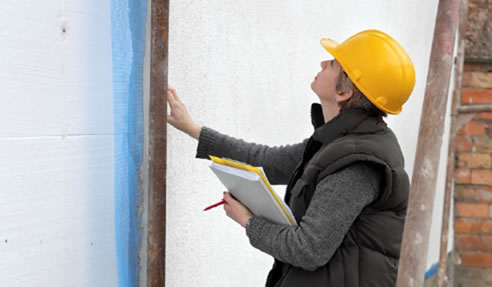Polystyrene Cladding, Changing the Built Environment

The evolution of polystyrene began in 1839 when a German named Eduard Simon discovered polystyrene. However, it wasn't until 1919 that Hermann Staudinger realised that the polystyrene composition is made up of long chains of styrene molecules called polymer.
Today, polystyrene is one of the game changers in the built environment. It has become one of the most cost-effective and versatile materials used in different applications, such as polystyrene cladding in building and construction, protective packaging, signage and displays. It is also one of the most common kinds of plastic known in history.
Properties of Polystyrene and Why It's the Material of Choice for Cladding Applications
Lightweight
Expanded polystyrene (EPS) is comprised of 98% air, making it an extremely lightweight polystyrene cladding material. It has no relative added weight which reduces transportation costs by saving energy on transport fuel and minimises vehicle emission. On-site handling is relatively easy and installation time is reduced.
Durability
Polystyrene is a thermoplastic substance that melts when heated and turns into a solid when it cools off. The closed cellular matrix of expanded polystyrene accounts for its exceptional durability and dimensional stability, two factors that are essential in polystyrene cladding and protective packaging application. Also, EPS contains no toxic substances that can cause offensive odours.

Moisture Resistance
EPS closed cell structure and rigid property results to its inability to absorb water. Even if EPS is exposed to wet conditions, there will be no loss of strength and functionality which makes EPS ideal to use in cold chain products and polystyrene cladding.
Thermal Efficiency
Its excellent thermal efficiency can be attributed to its closed cellular matrix. EPS is suitable to use across steel and timber studs, concrete and masonry buildings. EPS polystyrene cladding offers a practical and economical insulation solution.
High Impact Resistance
EPS is also known for its compressive strength, making it an excellent shock absorbing material ideal for protective packaging of a broad range of products like electronic products, computers and chemicals, appliances, and food and produce wrapping.
Versatility
Aside from polystyrene cladding, expanded polystyrene sheets are easily cut into many different sizes and shapes to fit the required application.
Its performance, technical versatility and cost-effectiveness make expanded polystyrene the material of choice that contributes to a sustainable built environment.
The Styroboard™ expanded polystyrene sheets from Foamex offer the ideal cladding solution that suits the high demands of today's building and construction industry. Styroboard™ polystyrene cladding is used for residential and commercial applications.
Contact Foamex for polystyrene cladding applications and detailed Styroboard™ product information today.

|





 Waffle Pod Void Formers - Diamond Pod by
Waffle Pod Void Formers - Diamond Pod by Polystyrene Foam Blocks for Cool Rooms
Polystyrene Foam Blocks for Cool Rooms Benefits of Recycling Polystyrene Foam
Benefits of Recycling Polystyrene Foam Oversized EPS Foam for Event Props by
Oversized EPS Foam for Event Props by Versatile Polystyrene Sheets Melbourne
Versatile Polystyrene Sheets Melbourne Lightweight Foam Blocks for Sustainable
Lightweight Foam Blocks for Sustainable Polystyrene Underfloor Insulation Sydney
Polystyrene Underfloor Insulation Sydney Robust Polystyrene Blocks for Tunnel
Robust Polystyrene Blocks for Tunnel XPS Slab Edge Insulation for Residential
XPS Slab Edge Insulation for Residential Foam Insulation to Lower Your Carbon
Foam Insulation to Lower Your Carbon Reduce Energy Bills with Rigid
Reduce Energy Bills with Rigid Polystyrene Waste Disposal Guidelines by
Polystyrene Waste Disposal Guidelines by EPS Foam Insulation for Garage Doors
EPS Foam Insulation for Garage Doors Superior Underfloor Insulation for Wood
Superior Underfloor Insulation for Wood XPS Insulation for Energy Efficient
XPS Insulation for Energy Efficient Extruded Polystyrene Foam for
Extruded Polystyrene Foam for Trust Foamex for Polystyrene Foam Block
Trust Foamex for Polystyrene Foam Block Waffle Pod Slabs for Sustainable Homes
Waffle Pod Slabs for Sustainable Homes Polystyrene Foam Packaging for Shipping
Polystyrene Foam Packaging for Shipping Foam Insulation for Draught-free Home by
Foam Insulation for Draught-free Home by
